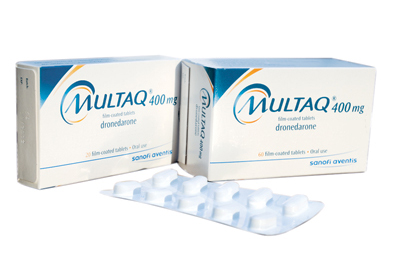
The European Medicines Agency (EMA) recommends restricting the use of the antiarrhythmic medication dronedarone (Multaq, Sanofi-Aventis) [1]. The committee states that because of the increased risk of liver, lung, and cardiovascular adverse events, dronedarone "should only be prescribed after alternative treatment options have been considered." Patients currently taking dronedarone should have their treatment reassessed by their physician at their next scheduled visit, the EMA reports.
Dronedarone is currently approved for the treatment of paroxysmal or persistent atrial fibrillation or atrial flutter, and according to the EMA's Committee for Medicinal Products for Human Use (CHMP), the drug should be used only in this population for the maintenance of sinus rhythm.
The recommendations are based on a review of the PALLAS trial, as well as other data suggesting an increased risk of liver and lung injury with dronedarone. In PALLAS, a study of patients with permanent atrial fibrillation, the data and safety monitoring committee stopped the trial early when they noticed an increased risk of cardiovascular events among patients with permanent atrial fibrillation treated with the drug compared with placebo. The CHMP initiated the review of the overall balance of benefit and risk early this year based on reports of severe liver injury with dronedarone. During the review, PALLAS was halted, and the committee was made aware of the increased risk of cardiovascular side effects--cardiovascular death, hospitalization, and stroke--with dronedarone, and based on this included cardiovascular safety in its overall assessment of the drug.
Based on its review, the CHMP was concerned that the "cardiovascular events shown in the population in the PALLAS study could mean an increased risk of cardiovascular side effects for some patients with nonpermanent atrial fibrillation." Despite restricting use, there are limited treatment options for patients with nonpermanent atrial fibrillation, according to the CHMP, so dronedarone might be a useful treatment option in selected patients.
The CHMP therefore was of the opinion that "the benefits of Multaq outweigh its risks in these patients, provided that further changes to the information for prescribers and patients will be introduced to minimize the risk of injury to the liver, lung, and heart."
Based on these recommendations, dronedarone should be restricted to patients with paroxysmal or persistent atrial fibrillation when sinus rhythm is obtained and should not be used when atrial fibrillation is still present. It should not be used in permanent atrial fibrillation or in patients with heart failure or those with left ventricular systolic dysfunction. It should also not be used in patients with a previous lung or liver injury following treatment with amiodarone. Patients with nonpermanent atrial fibrillation treated with dronedarone should be monitored by a specialist and have their lung, liver, and heart-rhythm function checked regularly.
The Food and Drug Administration is currently conducting its own review of the safety of dronedarone but has not yet reached a decision. In an email to heartwire , Sandy Walsh, in the FDA Office of Public Affairs, said the FDA still wants to patients and physicians to follow the advice provided in two recent safety communicationsabout dronedarone.
The new EMA alert comes just a few hours after the Wall Street Journal published a story reporting that pressure is mounting on US regulators to take a tougher stance with dronedarone [2]. The article quotes several cardiologists who question the safety and efficacy of the drug, with Dr Steven Nissen (Cleveland Clinic, OH) telling the paper that he believes the drug is dangerous. Others are quoted saying they know of no doctors using the drug, while Dr Sanjay Kaul (Cedars-Sinai Medical Center, in Los Angeles, CA) said the drug doesn't even appear safe in intermediate-risk patients. Spokespersons for Sanofi-Aventis told the Journal they stand behind the importance of dronedarone, saying it has a place for patients with nonpermanent atrial fibrillation.
In July, the FDA published its latest quarterly list of drugs to monitor after having identified potential signs of serious risks or new safety information, and dronedarone appeared on it for the fifth straight time.





 留言列表
留言列表
 線上藥物查詢
線上藥物查詢 